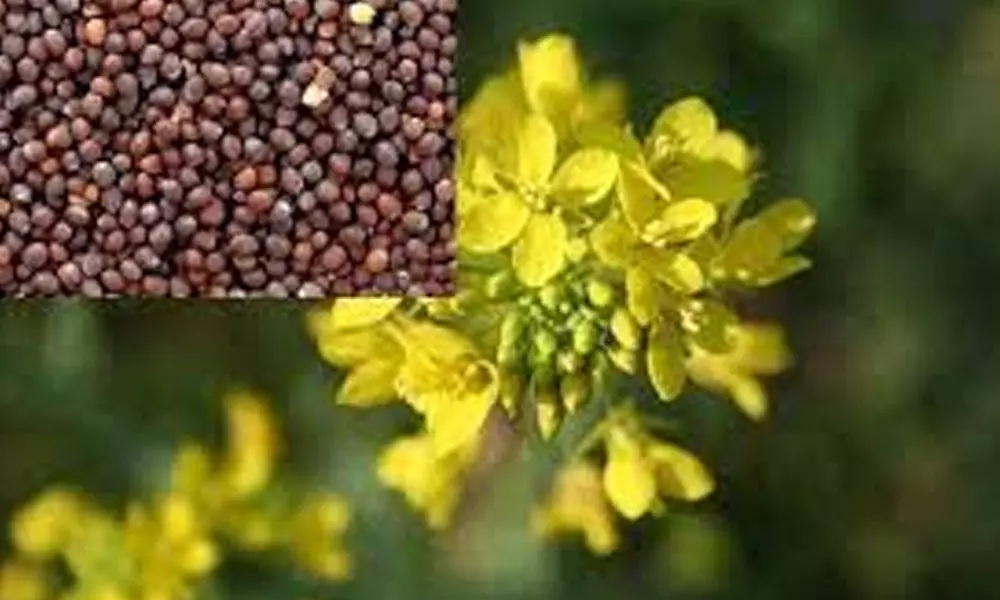Need to prioritise a mustard policy

Need to prioritise a mustard policy
Govt must be thanked for banning futures trading in mustard on the NCDEX for one year
We would like to start out by thanking the Government for banning futures trading in mustard on the NCDEX from 20th December 2021 for a period of one year. This is a very timely intervention in a critical situation wherein the prices of mustard and mustard oil have been skyrocketing, making this edible oil unaffordable for middle class consumers.
Against an MSP of Rs 4,600 per quintal, mustard oilseeds were being traded at prices as high as Rs 8,000 per quintal in the open market. The unabated and unbridled increase in mustard oilseed prices throughout the year led to the steep rise in mustard oil prices, and compelled a large section of mustard oil consumers to switch to imported edible oils that were available at lower price-points and cheaper brands of mustard oil which are mostly adulterated. This resulted in mustard oil manufacturing operations becoming uncompetitive.
The ban on futures is expected to curb speculation and check the hoarding mentality of certain big players; such practices are known to cause severe price fluctuations, more so in a market that is already volatile. The decision was also made with a view to cooling mustard prices and, to some extent, this has happened. The prevailing situation makes it imperative for the government to formulate a National Mustard Policy, ïan idea that we have been championing for several years now. In particular, farmers, who are key stakeholders, need to be one of the main areas of focus in the proposed policy.
Mustard is a very important crop from a national perspective. India is the world's fourth largest cultivator of mustard, and the mustard crop accounts for over 28 per cent of India's oilseeds production. The total area under mustard cultivation is over 25 lakh hectares and mustard production for 2020-21 touched a whopping 9.12 million tonnes in spite of significant pre-harvesting crop losses in Rajasthan caused by hailstorms. Mustard and mustard oil have been a part of India's culinary heritage for several millennia and a National Mustard Policy would be an ideal way to nurture, safeguard and promote this legacy. Moreover, since India has age-old capabilities for manufacturing traditional cold-pressed mustard oil, this home-grown industry aligns admirably with the government's vision for self-reliance as exemplified by the Atmanirbhar Bharat Abhiyaan. As an extension of this endeavour, the Government should also take proactive measures to protect mustard oil from the onslaught of imported edible oils.
In this context, another important policy measure would be to allow the export of branded mustard oil in bulk. Currently, only small packs are allowed and they must compulsorily be labelled "For External Use Only" for the US and European Union markets. The government should lobby with the relevant international regulatory authorities to get this inaccurate and misleading labelling requirement removed. The global reputation of mustard oil as a natural, healthy cooking medium has been growing in recent years and the export of Indian mustard oil has the potential to create new opportunities for both farmers and manufacturers.
The proposed National Mustard Policy should also explore the possibilities of significantly expanding the area under cultivation by developing mustard farming in states like Assam and Jharkhand where the weather conditions are suitable for mustard. The mustard crop requires two irrigation cycles during the season, and both the states have adequate water resources. Moreover, the agricultural fields in those states are not used for any winter crops after paddy harvesting, so mustard cultivation can enhance productivity and profitability for the farmers there.
The policy should also promote organic mustard cultivation in India as part of the Atmanirbhar Bharat Mission. The consumption of organic products as part of a healthy, holistic lifestyle in urban areas is on the rise. Organic mustard oil could also have high export potential.
Yet another key focus area is mustard oilcake (known as Sarson Khal), which often gets ignored even though it is an integral part of the mustard value chain. The oilcake is largely used as part of cattle-feed and also has farming applications as a safe, chemical-free natural fertilizer. The government should promote research and investments in the development of mustard oilcake. Any value addition achieved by such research will go a long way in supporting dairy farmers.
Understandably, the rollout of such a policy requires infrastructure, supporting systems and networking capabilities. To this end we have, in the past, recommended the constitution of a Mustard Oil Development Board. Examples of the effectiveness of such an institution can be seen in the Malaysian Palm Oil Board, the American Soybean Association and Spain's International Olive Council. All these organisations have been successful in marketing their countries' oil to the world; so why should mustard oil be left behind?
As India's mustard oil industry emerges from the shadow of the pandemic, the time is just right for formulating and implementing a mustard policy. It is the need of the hour and must be prioritised.

